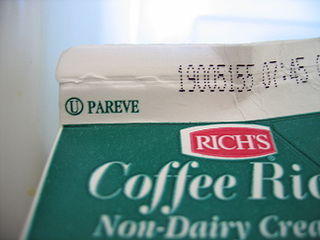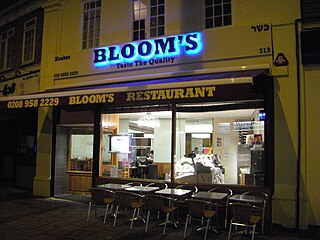Kashrut is a set of dietary laws dealing with the foods that Jewish people are permitted to eat and how those foods must be prepared according to Jewish law. Food that may be consumed is deemed kosher, from the Ashkenazi pronunciation of the term that in Sephardi or Modern Hebrew is pronounced kashér, meaning "fit". Food that may not be consumed, however, is deemed treif, also spelled treyf. In case of objects the opposite of kosher is pasúl.

The Reuben sandwich is a North American grilled sandwich composed of corned beef, Swiss cheese, sauerkraut, and Russian dressing or Thousand Island dressing, grilled between slices of rye bread. It is associated with kosher-style delicatessens but is not kosher, as it combines meat and cheese.

Schmaltz is rendered (clarified) chicken or goose fat. It is an integral part of traditional Ashkenazi Jewish cuisine, where it has been used for centuries in a wide array of dishes, such as chicken soup, latkes, matzah brei, chopped liver, matzah balls, fried chicken, and many others, as a cooking fat, spread, or flavor enhancer.
Kosher foods are foods that conform to the Jewish dietary regulations of kashrut. The laws of kashrut apply to food derived from living creatures and kosher foods are restricted to certain types of mammals, birds and fish meeting specific criteria; the flesh of any animals that do not meet these criteria is forbidden by the dietary laws. Furthermore, kosher mammals and birds must be slaughtered according to a process known as shechita and their blood may never be consumed and must be removed from the meat by a process of salting and soaking in water for the meat to be permissible for use. All plant-based products, including fruits, vegetables, grains, herbs and spices, are intrinsically kosher, although certain produce grown in the Land of Israel is subjected to other requirements, such as tithing, before it may be consumed.

Jewish cuisine refers to the worldwide cooking traditions of the Jewish people. During its evolution over the course of many centuries, it has been shaped by Jewish dietary laws (kashrut), Jewish festivals and holidays, and traditions centred around Shabbat. Jewish cuisine is influenced by the economics, agriculture, and culinary traditions of the many countries where Jewish communities have settled and varies widely throughout the entire world.

In kashrut, the dietary laws of Judaism, pareve or parve is a classification of food that contain neither dairy nor meat ingredients. Food in this category includes all items that grow from the ground, fish, eggs, and non-biological edible items.

An appetizing store, typically in reference to Jewish cuisine in New York City, particularly Ashkenazi Jewish cuisine, is a store that sells "food that generally goes with bagels", although appetizings can also be served with a variety of breads. Appetizings include smoked and pickled fish and fish spreads, pickled vegetables, cream cheese spreads and other cheeses.

The Islamic dietary laws (halal) and the Jewish dietary laws are both quite detailed, and contain both points of similarity and discord. Both are the dietary laws and described in distinct religious texts: an explanation of the Islamic code of law found in the Quran and Sunnah and the Jewish code of laws found in the Torah, Talmud and Shulchan Aruch.

A breakfast sandwich is any sandwich filled with foods associated with breakfast. Breakfast sandwiches are served at fast food restaurants and delicatessens, sold in supermarkets, or commonly made at home. Different types of breakfast sandwich include the bacon sandwich, the egg sandwich, and the sausage sandwich; or various combinations thereof, like the bacon, egg and cheese sandwich. The breakfast sandwich is related to the breakfast roll.

Israeli cuisine primarily comprises dishes brought from the Jewish diaspora, and has more recently been defined by the development of a notable fusion cuisine characterized by the mixing of Jewish cuisine and Arab cuisine. It also blends together the culinary traditions of the various diaspora groups, namely those of Middle Eastern Jews with roots in Southwest Asia and North Africa, Sephardi Jews from Iberia, and Ashkenazi Jews from Central and Eastern Europe.

A kosher restaurant or kosher deli is an establishment that serves food that complies with Jewish dietary laws (kashrut). These businesses, which also include diners, cafés, pizzerias, fast food, and cafeterias, and are frequently in listings together with kosher bakeries, butchers, caterers, and other similar places, differ from kosher-style businesses in that they operate under rabbinical supervision, which requires the observance of the laws of kashrut, as well as certain other Jewish laws, including the separation of meat and dairy.

Montreal-style smoked meat, Montreal smoked meat or simply smoked meat in Quebec is a type of kosher-style deli meat product made by salting and curing beef brisket with spices. The brisket is allowed to absorb the flavours over a week. It is then hot smoked to cook through, and finally is steamed to completion. This is a variation on corned beef and is similar to pastrami.

This is a categorically organized list of foods. Food is any substance consumed to provide nutritional support for the body. It is produced either by plants, animals, or fungi, and contains essential nutrients, such as carbohydrates, fats, proteins, vitamins, and minerals. The substance is ingested by an organism and assimilated by the organism's cells in an effort to produce energy, maintain life, or stimulate growth.

A bagel and cream cheese is a food pairing that consists, in its basic form, of a sliced bagel spread with cream cheese. Bagels with cream cheese are traditionally and most commonly served sliced horizontally and spread with cream cheese and other toppings.

American Jewish cuisine comprises the food, cooking, and dining customs associated with American Jews. It was heavily influenced by the cuisine of Jewish immigrants who came to the United States from Eastern Europe around the turn of the 20th century. It was further developed in unique ways by the immigrants and their descendants, especially in New York City and other large metropolitan areas of the northeastern U.S.

Ashkenazi Jewish cuisine is an assortment of cooking traditions that was developed by the Ashkenazi Jews of Central, Eastern, Northwestern and Northern Europe, and their descendants, particularly in the United States and other Western countries.

A Jewish deli, also known as a Jewish delicatessen, is a store that serves various traditional dishes of Jewish cuisine, mostly Ashkenazi Jewish cuisine. Known for their robust sandwiches, such as pastrami on rye, they also specialize in traditional Jewish diaspora soups and other ethnically-rooted dishes. As retail delicatessens, most also sell a selection of their products such as sliced meats by the pound, prepared salads, pickles, and offer dine-in or take-out.

Kornblatt's Delicatessen was a Jewish deli in Portland, Oregon. The business operated from 1991 to March 2023.
















